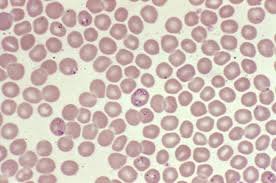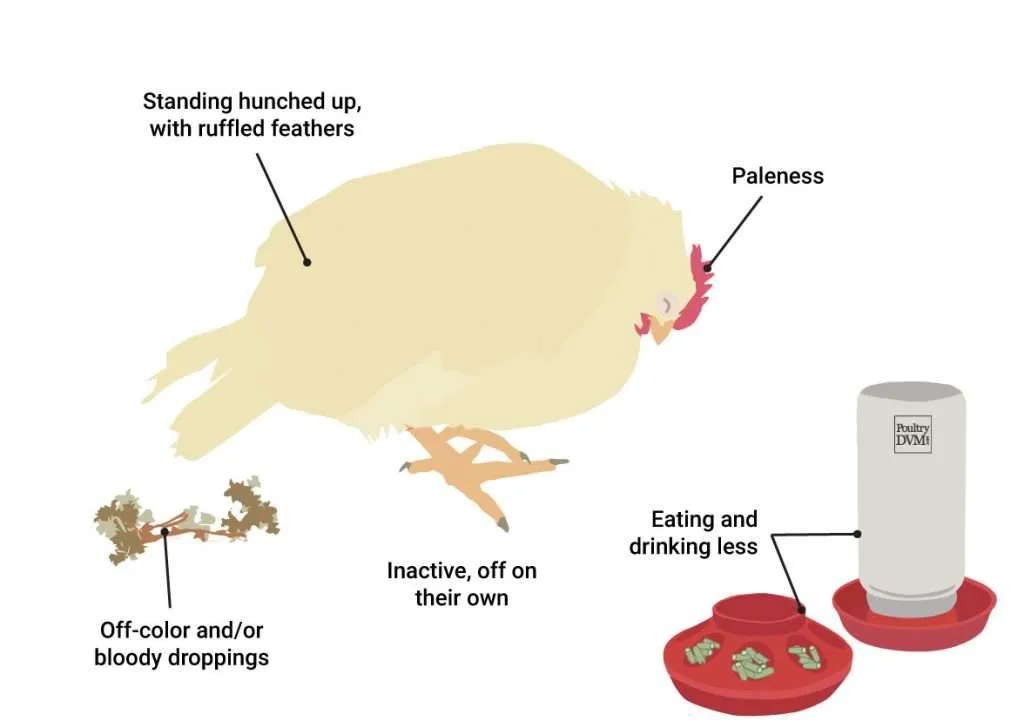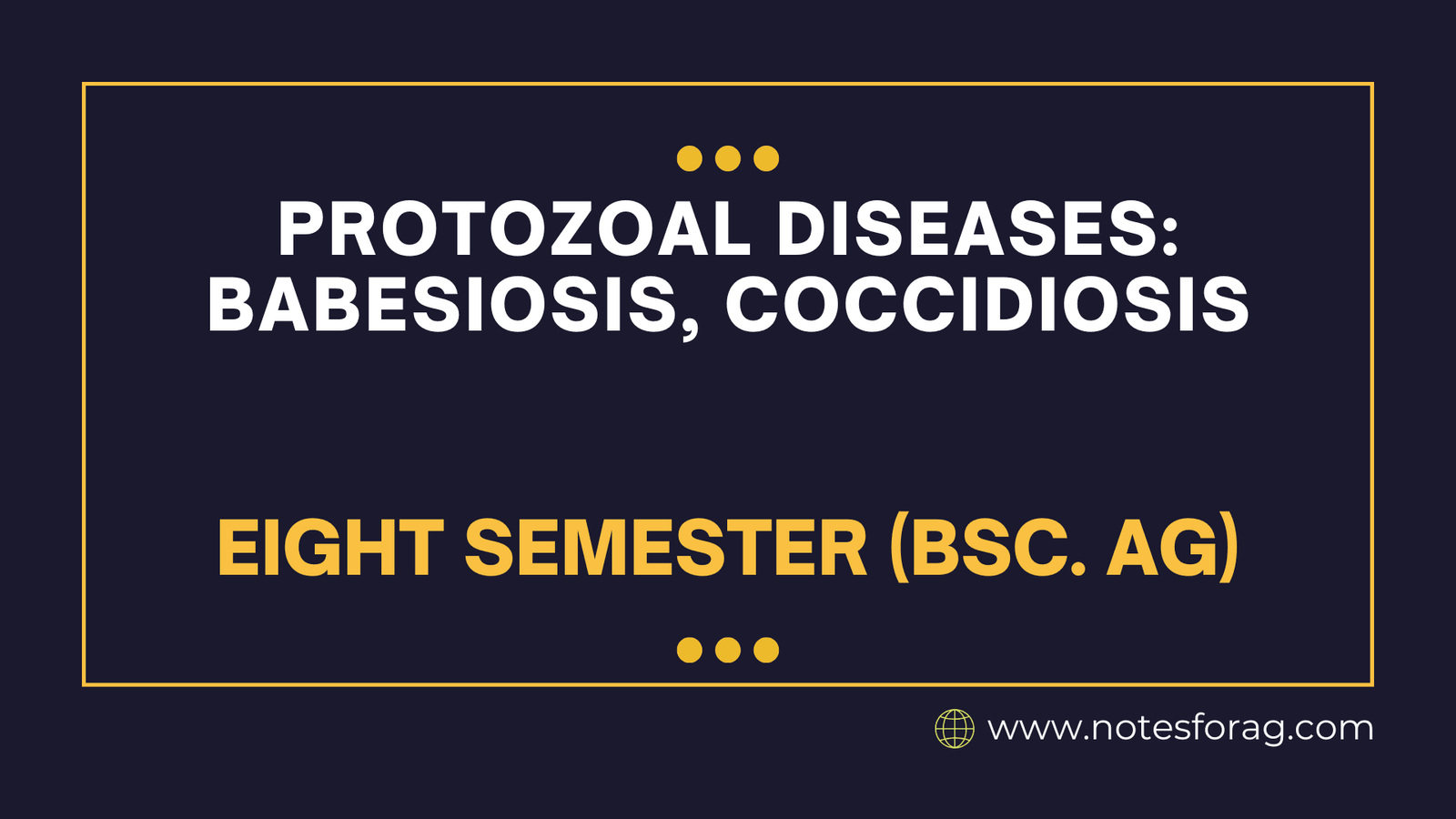Protozoal diseases are caused by tiny single-celled organisms that can live inside or on animals. These parasites can affect livestock like cows, sheep, and chickens, causing health problems such as fever, weight loss, and sometimes death. Two common protozoal diseases in animals are Babesiosis and Coccidiosis. Here, we’ll explain what these diseases are, how animals get infected, the symptoms to look for, and how they can be treated and prevented.
Table of Contents
Babesiosis (Texas Cattle Fever)
What is Babesiosis?

Babesiosis is a disease caused by tiny parasites from the Babesia family. These parasites infect the red blood cells in animals, which can lead to anemia (low red blood cell count). It’s often seen in cattle but can also affect other animals like dogs and horses. The disease is sometimes called Texas cattle fever because it’s common in warm areas.
How do animals get infected?
Babesiosis is spread by ticks. When an infected tick bites an animal, it transfers the parasite into the animal’s blood. Once in the bloodstream, the parasites attack the red blood cells, causing damage.
What are the symptoms?
Animals with Babesiosis may show symptoms like:
- Fever
- Weakness or tiredness
- Pale gums or eyes
- Loss of appetite
- Yellowing of the skin or eyes (jaundice)
- Dark-colored urine (due to broken-down red blood cells)
- Rapid heart rate
- Weight loss
- In severe cases, the animal can die.
How is Babesiosis treated and prevented?
Treatment for Babesiosis usually involves medicine that kills the parasites, like imidocarb or diminazene. In severe cases, animals may need fluids or a blood transfusion to recover.
To prevent Babesiosis, farmers can:
- Control tick populations with tick repellents or treatments.
- Regularly check animals for ticks and remove them.
- Keep the environment clean and free of tall grass or bushes where ticks live.
- Use vaccines for livestock where available.
Coccidiosis
What is Coccidiosis?

Coccidiosis is a disease caused by a different type of protozoa called Eimeria, which affects the intestines of animals like chickens, cattle, sheep, and goats. The parasite damages the lining of the intestines, leading to digestive problems.
How do animals get infected?
Animals get coccidiosis by ingesting oocysts (the egg-like form of the parasite) that are passed in the feces of an infected animal. The oocysts can contaminate the environment, including food, water, bedding, or the ground, and animals ingest them when they eat or drink contaminated items.
What are the symptoms?
The symptoms of coccidiosis can vary, but they usually include:
- Diarrhea (sometimes with blood or mucus)
- Dehydration (from fluid loss due to diarrhea)
- Poor appetite and weight loss
- Weakness or tiredness
- Ruffled feathers (in chickens) or dull coats (in other animals)
- In severe cases, the animal may die from dehydration or severe intestinal damage.
How is coccidiosis treated and prevented?
Coccidiosis is treated with medications called anticoccidials, like sulfa drugs or amprolium. These medicines kill the parasite in the intestines. Animals that are dehydrated from diarrhea may also need fluids to recover.
To prevent coccidiosis, farmers should:
- Keep animal housing clean and dry to prevent contamination.
- Provide clean water and avoid overcrowding, which increases the risk of infection.
- Use coccidiostats (medications that help prevent infection) in the animals’ feed, especially for young animals.
- Ensure animals have good nutrition to help maintain their immune system.
Conclusion
Babesiosis and Coccidiosis are both common protozoal diseases that can cause serious health problems in animals. Babesiosis is caused by a parasite spread by ticks, leading to blood cell damage and anemia. Coccidiosis, on the other hand, is caused by a parasite that infects the intestines, leading to diarrhea and dehydration. Both diseases can be treated with the right medications, and good management practices like controlling ticks and maintaining clean environments are key to preventing these infections. By staying aware of the symptoms and taking preventive measures, farmers can help keep their animals healthy and free from these diseases.
Frequently Asked Questions (FAQ)
How do animals get Coccidiosis?
Animals get infected with Coccidiosis by ingesting oocysts (the egg-like form of the parasite) found in contaminated feces, food, water, bedding, or soil.
How is Babesiosis treated?
Babesiosis is treated with antiprotozoal medications like imidocarb or diminazene, which kill the parasites. In severe cases, the animal may require fluids or a blood transfusion to help it recover.
Related Articles

